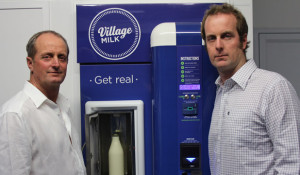While Victorian regulators want to ban the sale of raw milk, in New Zealand it’s sold in on-farm vending machines.
 Dairy company Village Milk in Golden Bay, on New Zealand’s South Island, is selling up to 300-litres of raw milk a day from their on-farm vending machines.
Dairy company Village Milk in Golden Bay, on New Zealand’s South Island, is selling up to 300-litres of raw milk a day from their on-farm vending machines.
Village Milk owner, Mark Houston, said the focus on safety was rigorous.
He said they had not had a health scare in their four years of operating.
“Our whole farm is totally geared for raw milk sales, so under our rules we’re allowed to do that but people have to come to the farm to buy it,” he said.
“The milk is prepared for drinking without processing and it’s incredibly clean and it’s incredibly high quality and it’s extensively tested.”
Dairy farmers in New Zealand are allowed to sell raw milk under a 50 year-old law allowing customers who live in remote areas to buy milk from their local farmer.
Raw milk producers have used the rule to increase farm sales.
Mr Houston said farmers are subject to Ministry for Primary Industries safety regulations.
“The risk management program covers everything,” he said.
“There are inspections of the stock, shed inspections, there’s a testing regime, there’s verification of the record keeping.
“It’s quite intense.”
In New Zealand individuals are allowed to purchase up to five litres of raw milk a day at a cost of $NZ2.50 per litre.
Once the milk enters the vending machine, it has 24 hours to be sold before it is replaced with a new batch the next day.
Dairy Safety Victoria is one organisation that wants to ban the sale of raw milk.
“A wide variety of organisms that can cause illness can be found in raw cow’s milk,” Dairy Safety Victoria said in a statement.
“No matter how carefully it has been produced, raw milk may be unsafe because it can contain these organisms that cause illness.”
